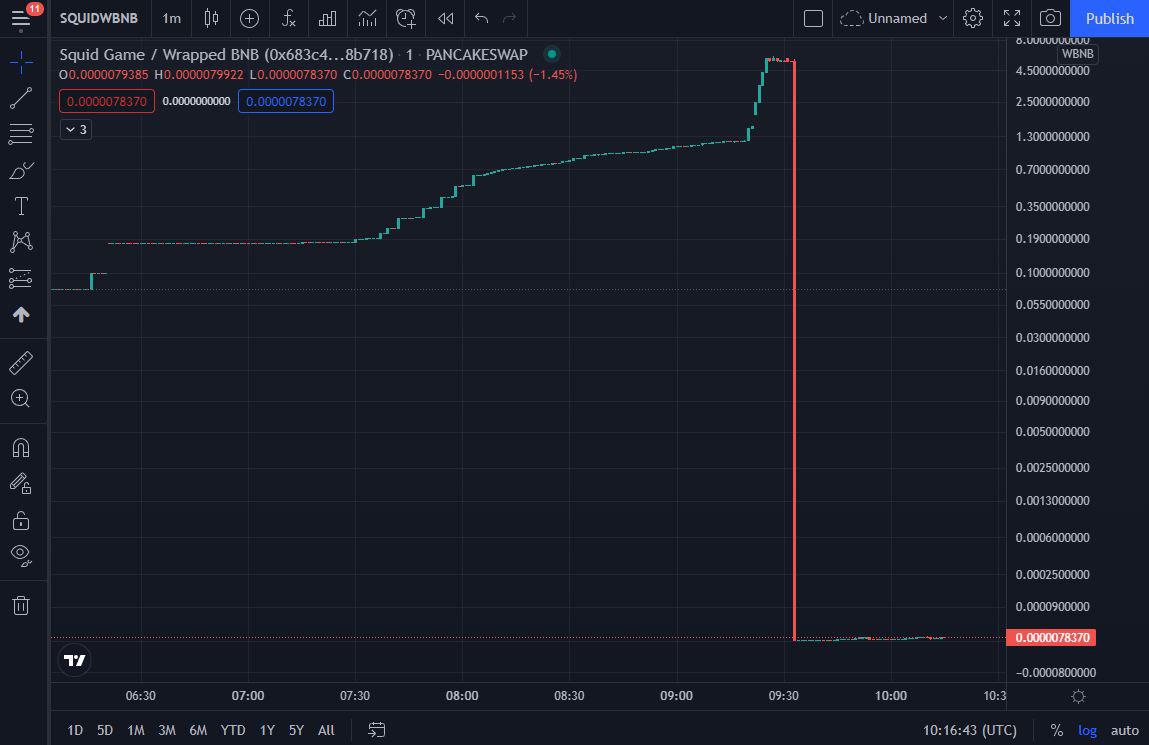The Squid Game Crypto Scam: A Deceptive Play-to-Earn Nightmare

The Squid Game Crypto Scam: Anatomy of a Multi-Million Dollar Rug Pull
The world of cryptocurrency offers immense opportunities, but its rapid evolution and pockets of minimal regulation also attract bad actors. Few incidents exemplify this dark side as starkly as the Squid Game cryptocurrency scam (SQUID). Capitalizing on the massive global popularity of the Netflix series Squid Game, scammers orchestrated a textbook hype-driven fraud in late 2021, culminating in a devastating "rug pull" that vanished with an estimated $3.38 million of investor funds in minutes. This article dissects how the scam unfolded, the warning signs that were missed, and the crucial lessons it offers for navigating the crypto market safely.
Riding the Hype Wave: The SQUID Token Emerges
Launched in late October 2021, precisely when the Squid Game series was at its peak cultural saturation, the SQUID token appeared seemingly out of nowhere. Its creators claimed it was the official token for a forthcoming play-to-earn game mirroring the show's high-stakes survival challenges.
The Bait: A Game of High Rewards
The project's narrative was simple yet effective: players would use SQUID tokens to enter virtual games inspired by the show. Success would yield more SQUID tokens, with a massive grand prize supposedly awaiting the final winner. This gamified premise, tied to a globally trending phenomenon, proved irresistible to many.
The Unbelievable Surge: FOMO Takes Over
Fueled by intense social media buzz and coverage (often uncritical) from some mainstream news outlets fascinated by its connection to the show, the SQUID token's price embarked on an astronomical climb. In just a matter of days, its value exploded by over 230,000% (not 2300%), soaring from fractions of a cent to an eye-watering peak of $2,861 on November 1, 2021. This parabolic rise, far exceeding any rational valuation, was driven almost entirely by hype and the intense Fear Of Missing Out (FOMO) among retail investors.

Warning Signs Ignored Amidst the Mania
Despite the frenzy, the SQUID project was riddled with glaring red flags that should have alerted potential investors. The hype, however, overshadowed critical analysis for many.
1. The Inescapable Trap: The "Anti-Dumping" Mechanism
The most significant and malicious red flag was embedded directly in the token's smart contract: users who bought SQUID found they could not sell it. The developers falsely marketed this as an "anti-dumping mechanism" to prevent price drops. In reality, it was a deliberate trap ensuring only the developers could liquidate the token. Legitimate projects may have vesting schedules or lock-ups for teams/early investors, but preventing all holders from selling is an undeniable sign of a scam. The supposed requirement to hold another token ("Marbles") to sell was a convoluted obfuscation tactic. If you cannot freely sell an asset you bought on an open market, consider it compromised.
2. Veiled Identities and Shoddy Documentation
Transparency is crucial for legitimate crypto projects. The SQUID team, however, remained completely anonymous. There was no verifiable information about the developers, their experience, or any credible partnerships. Furthermore, the project's website and whitepaper were reportedly plagued with grammatical errors, inconsistencies, and vague technical details, hallmarks of hastily constructed scams rather than serious ventures. Always prioritize projects with public, verifiable teams and professional documentation. Undertake Do Your Own Research (DYOR).
3. False Association with Squid Game
The project explicitly used the Squid Game name, theme, and imagery to attract investors, despite having no official affiliation with Netflix or the show's creators. This blatant piggybacking on established intellectual property without permission was a major ethical and legal red flag. Always verify partnerships and endorsements claimed by a project.
4. Media Amplification Without Due Diligence
The token's astronomical price surge attracted attention from major media outlets. Unfortunately, many reports focused solely on the dramatic price action without adequately investigating the project's fundamentals or legitimacy. This created a false sense of credibility, drawing in more unsuspecting investors who assumed the project must be viable if it was featured on reputable news sites.
The Rug Pull: Millions Vanish in Minutes
On November 1, 2021, mere days after its peak hype, the inevitable happened. The anonymous developers executed a classic "rug pull".
How They Did It: Draining the Liquidity Pool
- Most SQUID trading likely occurred on a Decentralized Exchange (DEX). On DEXs, tokens trade against liquidity pools, typically containing the project token (SQUID) paired with a valuable base asset (like BNB or ETH).
- The developers, controlling the contract and likely a large portion of the SQUID supply, removed the valuable base asset (the BNB/ETH) from the liquidity pool.
- This instantly drained all real value from the pool, leaving only the now worthless SQUID tokens behind.
- Simultaneously, they shut down the project's website and social media channels, disappearing with the stolen funds (estimated at $3.38 million).
- Investors watched in real-time as the token's price crashed from over $2,800 to effectively zero within minutes, unable to sell their holdings due to the anti-sell mechanism.

The Human Cost: Financial Ruin and Broken Trust
The fallout was devastating. Countless investors, many new to cryptocurrency and lured by the hype, reported losing significant sums, including life savings. Beyond the financial loss, the scam caused immense emotional distress and severely damaged trust in the crypto space for those affected. It served as a harsh lesson in the dangers of speculation without investigation.
Lessons Forged in Fire: Avoiding the Next SQUID Scam
The SQUID token scam, while notorious, provides invaluable lessons for navigating the often volatile crypto market. Recognizing the tactics used can help protect against future fraud.
- Lesson 1: Extreme Hype is a Danger Signal: Parabolic price rises detached from any real utility or development, especially when tied to fleeting pop culture trends, are often unsustainable and potentially indicative of manipulation. Understand Crypto Volatility.
- Lesson 2: Verify Token Sellability: Before investing significantly, check if the token can actually be sold on the open market. Small test transactions can be revealing. An inability to sell is an absolute red flag.
- Lesson 3: Scrutinize the Team and Documentation: Anonymous teams and unprofessional documentation are major warning signs. Legitimate projects prioritize transparency. Do Your Own Research (DYOR)!
- Lesson 4: Question Unrealistic Promises & Narratives: Be skeptical of "guaranteed" high returns or projects relying solely on hype (like many Memecoins, though SQUID added malicious code). Focus on underlying value and utility.
- Lesson 5: Understand Basic Tokenomics & Contracts: Knowing how liquidity pools work and recognizing malicious contract functions (like anti-sell mechanisms) provides a crucial layer of defense.
- Lesson 6: Resist FOMO: Fear Of Missing Out clouds judgment. Invest based on rational analysis, not social media pressure or rapid price increases.
- Lesson 7: Media Coverage ≠ Legitimacy: News reports, especially those focused on price, do not constitute an endorsement or validation of a project's viability or safety.
For a comprehensive guide on identifying and avoiding various crypto scams, please read: How to Avoid Crypto Scams.
The Aftermath: Calls for Regulation and Education
Incidents like the SQUID scam inevitably lead to increased calls for regulatory oversight in the cryptocurrency market to protect retail investors. While regulation evolves slowly, the primary defense remains investor education and community vigilance. Learning to identify red flags, understanding the technology, and fostering a culture of critical assessment are key to building a safer ecosystem. Even for Crypto For Beginners, understanding these risks is paramount.
Conclusion: A Cautionary Tale for the Crypto Age
The Squid Game cryptocurrency scam was a painful reminder that hype and innovation can be easily exploited. It demonstrated how quickly fortunes can seemingly be made and lost in unregulated markets, and how potent narrative tied to popular culture can be in overriding caution. By meticulously studying the red flags, understanding the mechanisms of the scam, and prioritizing due diligence and skepticism over FOMO, investors can better protect themselves from similar schemes in the future. The lessons from SQUID are harsh but essential for anyone participating in the world of digital assets.






